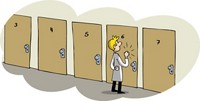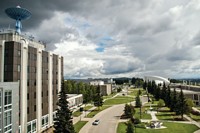Advertisement
Grab your lab coat. Let's get started
Welcome!
Welcome!
Create an account below to get 6 C&EN articles per month, receive newsletters and more - all free.
It seems this is your first time logging in online. Please enter the following information to continue.
As an ACS member you automatically get access to this site. All we need is few more details to create your reading experience.
Not you? Sign in with a different account.
Not you? Sign in with a different account.
ERROR 1
ERROR 1
ERROR 2
ERROR 2
ERROR 2
ERROR 2
ERROR 2
Password and Confirm password must match.
If you have an ACS member number, please enter it here so we can link this account to your membership. (optional)
ERROR 2
ACS values your privacy. By submitting your information, you are gaining access to C&EN and subscribing to our weekly newsletter. We use the information you provide to make your reading experience better, and we will never sell your data to third party members.
Education
Recession Chemistry 101
Some department chairs say they're coping, while others are just hanging on
by Jyllian N. Kemsley
June 15, 2009
| A version of this story appeared in
Volume 87, Issue 24

With the U.S. economy in recession since December 2007, colleges and universities of all kinds are feeling the effects: State universities are seeing budget cuts because of declining tax revenue, tuition-dependent schools are concerned about students' ability to pay, and endowment-based institutions have seen their fund values drop by as much as 30%. The news for higher education overall has sounded dire. At the department level, however, experiences vary significantly, with some weathering the economic downturn well while others struggle, desperately hoping budgets don't drop further.
Looking back at the 2008–09 academic year, "it was a fairly upbeat year overall, given what's happening in the country," says David M. Walba, chair of the chemistry and biochemistry department at the University of Colorado, Boulder. "We've had worse cuts than this in the last 10 years."
The school has frozen faculty and staff salaries but is still hiring selectively, and Walba's department was able to complete its searches for two positions—one in nanoscience and energy research and the other in theoretical chemistry.
Looking ahead to 2009–10, unlike in past years, stipends for graduate student teaching and research assistants at CU Boulder will not increase, although faculty grant budgets will have to absorb an 8% increase in resident graduate student tuition. Undergraduate laboratory fees have been flat for the past few years but remain sufficient to take care of supplies and equipment repair or replacement, Walba says.
The biggest impact on his department has to do with a planned $16 million renovation of the undergraduate teaching labs. The plan has been put on hold until the state's fiscal situation improves. Meanwhile, a separate construction project for a new biotechnology building that would house biochemistry faculty is moving forward.
University of Florida (UF) chemistry department chair Daniel R. Talham is not nearly as upbeat as Walba. His department is entering its third year of cutbacks. Two years ago, the university found that its College of Liberal Arts & Sciences was overspending, and departments within the college had to cut 5 to 8% of their budgets, Talham says. Then state budget decreases led the university to make a 6% across-the-board budget cut for 2008–09.
For the upcoming year, the university is implementing an additional 4 to 5% cut. The good news for Talham is that, in his college, the latest reductions are being handled mainly through attrition of faculty and staff.
Talham's operating budget, not including salaries, now only covers phone charges and some copy paper. "It's forced us to rely heavily on donations for day-to-day operations," he says. Donations come from alumni or friends of the department, he says, and now pay for office supplies, seminar programs, equipment for teaching labs, and maintenance for departmental shops.
For undergraduate labs, the department added to the regular supply fees this year a separate infrastructure and instrument fee that will go toward instrument upkeep. It was something the department had planned to do anyway, Talham says, following in the steps of other schools, but the financial situation provided extra incentive to get the program into place.
Although many faculty searches at UF were canceled this past year, the chemistry department was able to hire three new faculty members. Multiple retirements have brought the tenured or tenure-track chemistry faculty roster to about 40, down from 50 a decade ago. Talham doesn't know yet whether the department will be able to add to its ranks again in the upcoming year.
Hiring additional chemistry faculty this past year was prioritized because the number of chemistry majors has doubled in the past five years, thanks in large part to a new state program that covers 80 to 100% of the tuition of any Florida high school student with a B+ average who attends a state university. The move has increased the quality of students that UF admits, and with that increase in quality has come an increase in more technically inclined students, Talham says. It also means that the state has been slow to increase tuition, although the governor recently signed a law that will allow for up to 15% increases annually until Florida state university tuition matches the national average.

Fewer faculty and more students mean increased teaching loads. UF chemistry is coping with the situation by increasing class sizes, hiring temporary adjunct faculty, and even employing graduate students to head some classes. "This is a big change in culture for us," Talham says. "We've always prided ourselves in having tenure-track faculty in front of all of our classes." To handle the increased number of students, labs are running nonstop from 7 AM to 9 PM seven days a week. Summer sessions are also full.
In another coping tactic, the department admitted about 10% fewer graduate students for the upcoming year than usual, Talham says, noting that the move was a hedge against uncertainty at the time about what budget he would have for teaching-assistant stipends. Now, he's actually looking to fill some additional spots to start in January. And despite the budget crunch, the department has increased incoming graduate student stipends by 5% in each of the past two years.
The University of Wisconsin, Madison, is perhaps suffering even more than UF. In addition to a 5% midyear cut handed down from the state this past year, faculty and staff saw a promised 2% raise rescinded and will also have to take 16 unpaid leave days over the next two years.
Beyond furloughs, the university still doesn't know what's in store for the upcoming year, as the state budget has not yet been finalized. The College of Engineering is anticipating a 5% cut, says chemical and biological engineering department chair Michael D. Graham. As at other schools, most of the department-level budget is devoted to faculty salaries, so the additional cuts will put "a great deal of pressure on other aspects of the budget, such as teaching assistantships, staff support, and infrastructure," Graham says.
The university has instituted a tuition surcharge for families earning more than $80,000 per year. Whether income from the surcharge could mitigate cuts from the state is as yet unclear, Graham says.
So far, cuts in Graham's department have been absorbed through staff attrition. He's not sure what the next year will bring. Compounding Graham's concerns is that his department has also seen the number of majors nearly double in the past two years. With faculty hiring uncertain, he's hoping to at least add more teaching assistants next year, but he doesn't know that he'll have the money. "If we don't get an increased budget, then we're just going to have big, big sections and students aren't going to be served as well," Graham says. "One of the things that the public is going to have to realize is that, as they squeeze state universities, you can't ask for more service for less money."
At Pennsylvania State University, the school faced a midyear 6% cut in state allocations, although this translated into only a 2% cut for the chemical engineering department, says department head Andrew Zydney. The cut was easily absorbed by funds available from faculty positions left open from retirements, he says.
Penn State did not institute a hiring freeze, but departments took special pains to make sure candidates were particularly good fits before making offers, Zydney says, adding that it was also clear that getting funding from the university for start-up packages was going to be very tough. His department conducted searches in the fall for two positions, only one of which it filled.
The budget for the upcoming year is still up in the air, since the state government has not yet passed its budget, but Zydney has been told to plan for a permanent 2% cut. "We have curtailed a lot of discretionary spending," Zydney says, citing the department's undergraduate computer lab as one affected area. Of about 75 computers, normally one-third is replaced each year. The replacement process will be delayed until the financial situation improves, Zydney says.
Income from the department's endowment funds is also down about 8 to 10%, Zydney says. That doesn't have a significant effect on operating expenses, but it does reduce the discretionary funds available to faculty with endowed professorships or chairs for travel, supplies, equipment, and other expenses.
The endowment losses will also translate into less money for undergraduate scholarships. The department decided to continue existing scholarships at current levels, Zydney says, but fewer new scholarships will be available for incoming students.
Zydney is hoping to conduct another faculty search in the upcoming year, but permission for that from the dean of engineering won't be granted until later in the summer. Whether he can hire or not, Zydney notes that undergraduate majors in his department are up about 30%. The department is planning on larger class sizes, so faculty won't have more classes to teach, but they will have more students in each class. The impact of the larger classes will really hit in 2010–11, Zydney says, at which point the department may have to look at opening additional sections for upperclass labs.
One of the biggest recession impacts Zydney is seeing is in job prospects, most notably for undergraduates. "For last year's graduating class, in May of 2008, probably 90% of our students had positions in hand a couple of weeks before graduation," Zydney says. "This year that number dropped to about 60%." The university's spring career fair was considerably smaller than usual, he adds, and most of the companies that showed up were looking for co-op students or interns rather than permanent hires.
At Ithaca College, in New York, the past year "has been a little bit of a wild ride," says chemistry department chair Scott M. Ulrich. A primarily undergraduate school with about 6,000 students overall, Ithaca is principally dependent on tuition for its budget. Last fall, the college became worried that enrollment was going to drop below targeted levels, he says. The college canceled all but one of 30 new faculty searches, none of which were for chemistry.
Departments had a 3% midyear budget cut and were told to plan for an additional 3% for the upcoming year. In Ulrich's department, the budget cuts have essentially meant delaying replacement of teaching lab equipment. The department is also eyeing other expenditures conservatively and holding back on spending unless it's absolutely necessary, Ulrich says.
To address potential enrollment problems, the school retargeted its financial aid programs and encouraged faculty to reach out to prospective students. The efforts paid off: The school yielded a freshman class more than 10% larger than targeted. At the same time, the school is giving out more financial aid than usual, so budgets are staying tight.
Especially significant for Ulrich is that preliminary major selections by freshmen indicate that the number of chemistry majors is nearly 30, roughly double the number from recent years. Right now that won't make a big difference in classes, Ulrich says, but it could strain the department's resources down the road when the additional majors reach upper-level lab courses.
Northwestern University is also weathering the economic crisis fairly well so far, says chemistry department chair Joseph T. Hupp. The university did reduce its operating budget this year by 3%, but, at least in the College of Arts & Sciences, those were not passed down to the department level. "We've got a flat budget for next year and salary increases are minuscule," he says. "On the other hand, we're not seeing any furlough days, salary revisions, or things that would be much more painful."
The main impact on Hupp's department is that a capital improvement project to build a new facility for housing nuclear magnetic resonance and mass spectrometers and other departmental instrumentation has been slowed. The university is now seeking money from the American Recovery & Reinvestment Act through the National Institutes of Health to help with the project.
Hupp is also concerned about the impact of the economy on job prospects for chemistry graduate students and postdocs. The department cut back its incoming graduate class by about 15 to 20% to ensure that it could continue to support senior students who might be having trouble moving on in their careers. "If there's any way we can keep them for an extra quarter or two so they can find the right job," rather than taking whatever they can find or going unemployed, then the department has a responsibility to do so, he says.
Advertisement
Northwestern itself is continuing to hire faculty, which makes Hupp feel like he is sitting in a honey pot while others are just scraping mostly empty jars. Hupp is looking to add three or four faculty members to his department in the upcoming year. "I feel just awful for our competitors, but I'm pleased that we're able to stay in the game," Hupp says. "We may look back and see that these years were extraordinary years in terms of recruiting the very best scholars because we're one of the few top universities still in the game."

At Stanford University, the school's endowment value has dropped by 30%, necessitating an operating budget cut of 15% for the upcoming year. The school has frozen salaries and hiring, and it has also suspended all building projects that had not yet broken ground. One of the affected projects is a proposed teaching complex for chemistry and biology.
Chemistry chair Richard N. Zare says he is cutting discretionary spending, including his department's annual summer barbeque. He's had to reduce the department's administrative staff, mostly through attrition, and remaining staff may face furloughs.
Zare is using his department's reserve money to cushion some of the cutbacks, and in particular will be funding teaching assistant positions in the fall to maintain a full roster. He's also making sure the department stays in compliance with environmental and safety regulations. But he's expecting more budget cuts for 2010–11 and isn't sure that the money will hold out. "We had a reserve for a rainy day but we didn't expect a hurricane," Zare says.
He notes that the university would like to thin the faculty ranks through attrition and has offered incentives for faculty to retire, but that means that others will have to absorb the teaching load of those who depart. "From a chair's viewpoint, there's little reason to encourage this," Zare says. He also notes that the stock market collapse has had a significant effect not just on the university's endowment but also on retirement savings accounts, so "there's no indication that anyone is interested in retiring at this time."
Other department chairs interviewed by C&EN reported experiences similar to those related here. In whatever ways departments are being affected by the recession, one sentiment is universal: Everyone hopes the end of these lean times is near. Although some department heads can manage temporarily to put off equipment maintenance or cushion cuts with donations, the longer the downturn lasts, the harder that gets. "Every day I wake up hoping that today we reach bottom and start moving up," UF's Talham says.





Join the conversation
Contact the reporter
Submit a Letter to the Editor for publication
Engage with us on Twitter